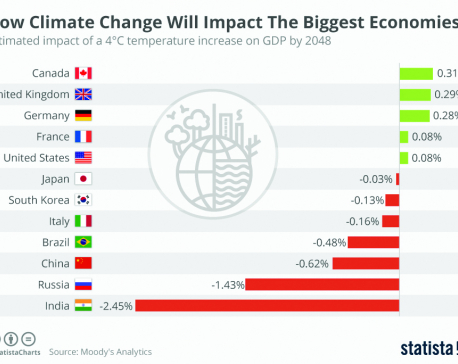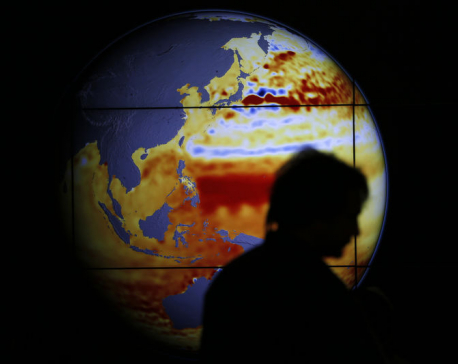
OR
Editorial
Addressing Unseen Realities of Climate Change
Published On: January 26, 2024 07:25 AM NPT By: Republica | @RepublicaNepal

Climate change has adversely impacted lives, livelihoods, and the economy worldwide, and Nepal is no exception. The impact of climatic risks on agricultural production, households, and physical assets can be quantified based on market prices. However, the disaster's impact is not limited to the economic sector; it equally affects biological and social life, causing damage to the ground, terrain, cultural heritage, local knowledge, and impacting human life, health, and transportation. Measuring the impacts of climate damage is a complex issue requiring proper research and evidence. In recent years, this issue has become a major focus in international climate negotiations, especially after the United Nations Climate Change Conference (COP-28) held in Dubai decided to operate the loss/damage fund, drawing attention to its practical implementation in countries like Nepal which are at the receiving end of the problem.
In this context, a recent study by a non-governmental organization has shown serious non-economic impacts of climatic disasters in Nepal. A massive flood in the Melamchi and Indrawati rivers two years ago caused severe damage to various structures, including settlements, agricultural land, bridges, roads, and electricity along the riverbanks. The study, using methods such as household surveys, community-based discussions, key informant discussions, and detailed field studies, revealed that 85 percent of locals experienced mental health problems due to the flood-related destruction. Furthermore, the study showed that 37 percent of respondents aged 46 to 60 and 26 percent aged 36 to 45 were among those highly affected mentally. The disaster caused mental stress, including mental trauma, anxiety, insomnia, business, and agricultural losses. Floods even affected cremation sites, leading to social tension. Many people fear future floods, and health problems such as fever, waterborne diseases, and skin issues have increased. Additionally, 40 percent of the general public lost access to health services, while educational access and basic services were disrupted for 73 percent and 40 percent of respondents, respectively. The study acutely showed that the disaster increased various forms of non-economic losses, including social interactions, cultural practices, religious activities, natural ecological systems, migration, and gender issues.
Locals have long demanded financial support from the government, with each household suffering a financial loss of 7 million rupees due to the calamity. However, they have only received assistance ranging from Rs 10,000 to Rs 500,000 per household. Local governments lack the resources for reconstruction, estimating over 10 years to compensate for the loss/damage in their locality based on the current budget. Nepal urgently needs massive financial support to address climate damage and expedite local recovery efforts. The government must make every effort possible to attract international finance and allocate additional budgetary support for local governments. The failure to do so may push locals into a financial crisis worse than the natural disaster, leading to greater psychological problems. We urge the government to prioritize addressing this issue seriously.
You May Like This

Infographics: How climate change will impact the biggest economies
A recent analysis by Moody's Analytics focused on the economic impact of climate change. The research looked at four different... Read More...

Climate change takes toll on French oyster farmers
Gulping down oysters has long been a favourite New Year's Eve ritual for the French, but as winters get warmer... Read More...

Pacific leaders seek U.S. return to Paris climate pact
SYDNEY, Sept 7: Pacific island nations declared climate change to be their “single greatest threat”, urging Washington to return to... Read More...










Just In
- NRB introduces cautiously flexible measures to address ongoing slowdown in various economic sectors
- Forced Covid-19 cremations: is it too late for redemption?
- NRB to provide collateral-free loans to foreign employment seekers
- NEB to publish Grade 12 results next week
- Body handover begins; Relatives remain dissatisfied with insurance, compensation amount
- NC defers its plan to join Koshi govt
- NRB to review microfinance loan interest rate
- 134 dead in floods and landslides since onset of monsoon this year








Leave A Comment